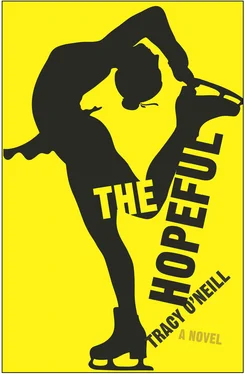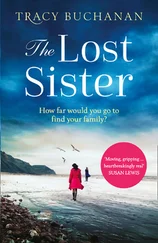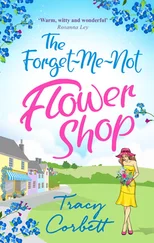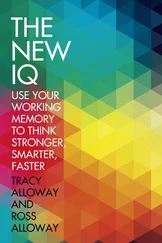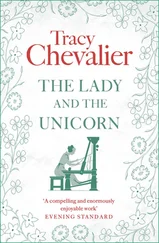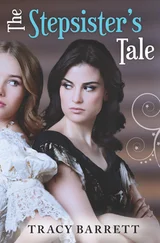“But enough isn’t enough,” I said. It was as though the decision had been made for me. I had always been wrong. I never had been akin to two mothers at all. There was a woman somewhere who had been fertilized with me, a woman who had waxed with my weight for so many moons. She saw the moment I transitioned from being a part of herself to another person, and still our bond was real because it was of the body. And so I reasoned that I was not upset, because this was not the end of my real family anyway. I would meet Dorothy after all.
The last time we met, you mentioned that you felt Dorothy to be more authentically your mother than Lou Doyle, says the doctor.
There’s none of the usual waiting for me to get comfortable. I’ve only just sat down. It’s as though she’s trying to get her time’s worth of talk today.
I believe I said I felt our bond was real because it was of the body, I say slowly. Of course that is enthymeme in Aristotelian terms. That’s one mistake Mark taught me.
Because it is missing the major premise of the syllogism.
That is the logical mistake, yes.
When she and I speak like this, in terms of rhetoric and ancients, it’s almost as though we’re equals. Logic is the great democratizer. We aren’t patient and doctor anymore. The only diagnoses are for the diseases of poor reasoning.
And this sense was in some way precipitated by the fact that you felt hurt by your mother, that is to say, Mrs. Doyle.
I was displeased with the missus, which she was by name if not action.
And was the discovery partially so upsetting to you because it was a shock?
I think about this. The body in shock often does not absorb pain. This I know from skating. A significant injury will not result in the mind’s evidence of destruction, pain, until it sees the body’s evidence of destruction: the blood, the bone, the emancipated organ. The pain intensifies with the consciousness of it.
At first there was anger, perhaps, but not pain, I say. The pain accrued as I began noting the clues I’d missed. So often I’d been thinking of the measures required to be an extraordinary person, instead of another high school student, that I didn’t see the signs. I remember my mother listing the symptoms of serial killers one day. “Disarmingly glib charm,” she told me. “Also needing stimulation. Pathological lying. Callousness and lack of realistic long-term goals.” But it was a joke to me. I said they might disarm in the sense of dismemberment. I didn’t see that her burgeoning fears resulted from spending time with Donnie O’Donnell, the true crime writer and prose stylist un-extraordinaire.
You cannot blame yourself for your mother’s affair.
I blame myself for blindness, for not seeing what was happening or what would before it happened.
And yet, have you not told me yourself that the future is mysterious? Have you not critiqued empiricist logic for the very reason that the past does not determine the future?
I have, I admit. In theory, the doctor is right, and it’s fine to talk high-gloss rhetoric in the utopia of logic, but this is my life, the real deal where ideas don’t amount to getting what you want. And anyway, as Mark once told me, utopia translates in Greek to mean “no place.”
So how, then, could you possibly know of your mother’s affair? It seems that you are shouldering some of the blame for the affair; you are not being fair to yourself.
Can I not be my own worst critic? There are limitations to what we know of anyone else. We can never know precisely what it is they think. Certainly, my parents didn’t know of my plan to return to skating, for example. And so, if we are the greatest experts on our own thoughts, if we have more evidence from which to draw a conclusion, does it not make sense that I would be my own worst critic because I know more of what is weak of myself?
But if you believe that you cannot know another’s thoughts, then too, you must believe that you could not have known that your mother was having or would have an affair — unless you believe that you were omniscient.
I think about this in the privacy of myself. There were clues outside the mind. Fear became a hobby for my mother. She posited murderous scenarios, and my father shot them down with homicide statistics. She bought pepper sprays and signed up for self-defense classes. She learned the vulnerabilities on the body of any assailant, and because she needed to curb her zeal too, bought yoga videos. She laid two mats in the living room and dragged me in when she pressed play. Hug your knees to your body, they call it the child’s pose. Lie back letting yourself sink into the floor, it’s the dead man’s pose. What’s in between? The daughter who believed her mother loved their family above all.
I do not believe I was omniscient, I say finally.
Here’s another way of looking at it: could she not love your family best and still love other things or people?
That was not the proportion of one love to the other for my mother.
So then you cannot understand the affair? asks the doctor. She doesn’t say it unkindly, and I can see how much she wants me to forgive my mother. I guess I do too, but I don’t have any idea how. The last time my parents came to visit, I tried to forgive her but before I knew it the anger had supplanted the decision to forgive, mounting and scaling to greater heights until my thoughts were so cruel I wanted again to forgive her in compensation for my cruelty.
I can understand that she had irony to her personality. Irony in the sense of being one way, while seeming to signify the opposite.
And who do you think Lou Doyle is?
More her sisters’ sister and her niece’s aunt than her daughter’s mother or her husband’s wife.
And who did you believe your father to be?
A hopeless Romantic, a Sick Rose.
And you, who do you believe yourself to be?
Which one?
She looks at me with her head crooked, as though appraising the levelness of a painting she’s just hung. You believe you are more than one person?
I believe that I’m Jesus Christ, the Father, the Holy Spirit. I believe I’m Trinity incarnate. I believe I am so many wrong answers and one right one in a multiple choice test. I believe the wrong outnumbers the right, but I believe the right ought to count for more.
I don’t believe you.
I don’t either, doc. I wish I did.
And yet, perhaps once you did believe you were infallible. You didn’t seem to be afraid at all when John Doe threatened you, if my notes are correct.
I was more afraid of not taking the surplus of drugs. By then, to some extent, I knew that you could never really have a surplus of drugs. You’d keep needing more and more.
But that didn’t make you question your decision to take the amphetamines.
Of course it sounds stupid now, I think to myself. If drugs perpetuate the need for more drugs, how did I ever think I’d be able to stop? Desperation is myopic, I guess. The doctor hadn’t asked a question, but I see that she’s waiting for me to answer her observation.
You know what Yogi Berra said? “When you come to a road, take it.” I’d been disappointed by so many other attempts to return to the person I was when I was going places. In this, of course, I include Ogden.
It was helpful for me to hear about your prior experiences with therapy.
I’m here to help myself. Just like the doctor ordered.
You imply that your work with Dr. Ogden was not particularly helpful though.
Put it this way: a year after my cousin Flake died, my Aunt Dina got a teacup terrier named Santa. One day when she came home, Santa had chewed apart the dog training book she’d been using. Therapy with Ogden was a little like that.
Читать дальше
